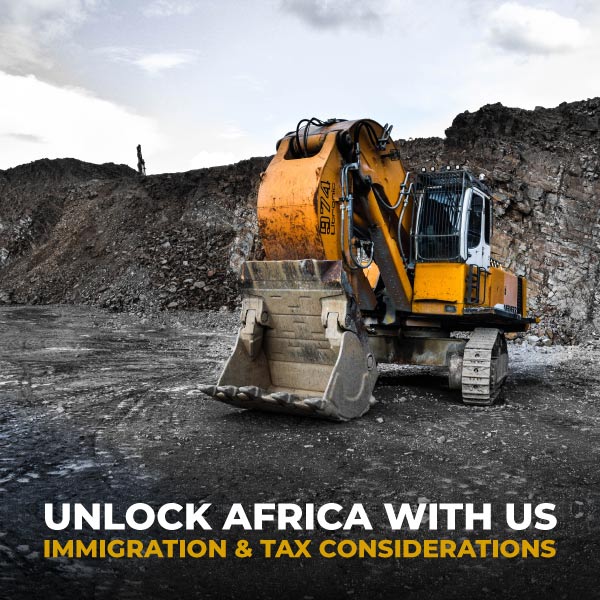UNLOCK AFRICA WITH US
IMMIGRATION AND TAX CONSIDERATIONS
One of the greatest concerns that plays on the minds of many South African expatriates and employers in Africa is that one day SARS will coming knocking to demand its massive 19% tax payment.
Across Africa, South African expatriates in the mining sector are annually taxed up to 19% of their annual cost to company, which 19% includes taxes on employer-provided benefits such as housing and home flights.
In order to navigate these tricky waters and unlock the full earning potential of working in Africa, it’s important that both expatriate and employer mitigate and handle these tax implications correctly.
Taxation considerations
Large multi-nationals looking to recruit foreign nationals, namely South Africans, should be cognisant of their potential tax liability in their home country.
For South African workers, prior to March 2020, if the expat met specific requirements under Section 10(1)(o)(ii) of the South African Income Tax Act (ITA), all foreign income was exempt from tax in South Africa.
However, from 1 March 2020, the exemption threshold of only the first R1.25m of foreign income became effective. Fringe benefits such as motor vehicle allowances, accommodation, school fees and security measures will be included in the remuneration.
Employers’ role in mitigating South African “expatriate tax”
Employers should rely on the relevant rulings or directives issued by the South African Revenue Service (SARS) when calculating the value of company benefits such as accommodation.
In many African countries, the “accommodation” is quite basic and can be anything from a tent to a hut, container, or a cabin. In terms of the legislation, a formula is applied to determine the value of accommodation. However, in the absence of market-related documentation, SARS will tax the value of accommodation at 19% of the total package. This is an unrealistically high rate for a “tent”, therefore a directive on how to value that type of accommodation must be obtained from SARS.
Employers can also allow South African expatriates to participate in an offshore pension fund where the employer contributes an amount of the total package to the fund, thereby reducing the employee’s taxable income. However, this is an extremely complex process and you should not use a service provider that follows a “fingers crossed” approach but rather one that can guarantee the legal integrity of the transaction at the outset.
The crux of the matter is that if tax planning is not considered upfront, this may increase the total cost of employing South Africans, and the additional administration of structuring packages for tax purposes may result in South Africans becoming less attractive as employees.
Concluding remarks
Proper planning and due diligence must be followed to ensure a smooth transition, especially where you plan to employ a large number of South African expatriates.
AUTHOR

Jashwin Baijoo
Admitted Attorney



